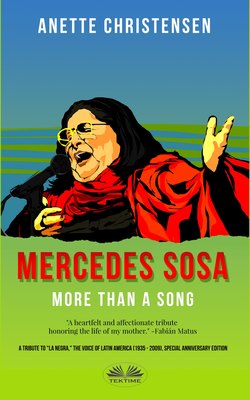Читать книгу Mercedes Sosa - More Than A Song - Anette Christensen - Страница 7
Denmark, October 4, 2009
Оглавление“The Argentine singer and folk heroine Mercedes Sosa has died from multiple organ failure at a hospital in Buenos Aires after being admitted three weeks ago. Her career spanned over six decades and she recorded more than forty albums, performing all over the world. Sosa was the underground reference point for many Argentines during the time of dictatorship, and through her songs she gave life to the protest movement among the working class, a movement which led to the collapse of the military junta in 1983. Mercedes Sosa became famous in Europe when she was living in exile in Spain and France from 1979 to 1982. She lived to seventy-four years old.”
IT’S A SUNDAY evening and I settle to watch the news with my husband. Along with a report of Mercedes Sosa’s death, a short film clip of a beautiful lady with long, dark hair, wearing a black dress with a red Andean poncho on top comes up on the TV screen. With extraordinary passion and a voice remarkable and soulful, she sings a song, “Gracias a la Vida” (Thanks to Life). I become captivated by her authenticity and charisma, and it takes only but a short while to realize I am watching a genuine and sincere woman so pure and extraordinary that I begin to wonder why I haven’t heard of her before now. As if nothing else matters, I get up to use the internet and find out more about this lady. An enormous number of YouTube links come up. I begin to watch and listen.
In the first clip, Mercedes sings “Zamba por vos” (Zamba for You) ever so gloriously with the Argentine folklore quartet, Los Chalchaleros. Radiant and graceful as a gentle embrace Mercedes arrives onstage with a consolatory smile on her lips and a sparkle of vitality in her eyes. To unending applause she proceeds to greet the members of the group, drawing them into warm embraces. Then she turns to the crowd and with a calm demeanor, starts singing in her contralto voice—deep, pleasant, and soft.
The second clip I watch is “Todo cambia” (Everything Changes), recorded at the Festival de Viña in Chile, 1993. Dressed in black from top to toe, she appears mystical and monumental, sounding just as powerful and convincing as she looks. I sense a tremendous energy emanating from her as she conquers the stage with her Latin American dancing steps and her scarf swinging above her head. I see a dynamic and forthright person who is unafraid of expressing her true self. The sincere and tender yet firm look in her eyes captivates me, and I feel as though she is looking directly into my soul through the computer screen. There is something about her, a “mystical presence,” which reaches to the deepest parts of my being, and my well of longing. Tears stream down my face as I realize I have encountered something that I have always hoped to find.
I instinctively know that she is a singer with a message and a mission. I want to find out what they are.
